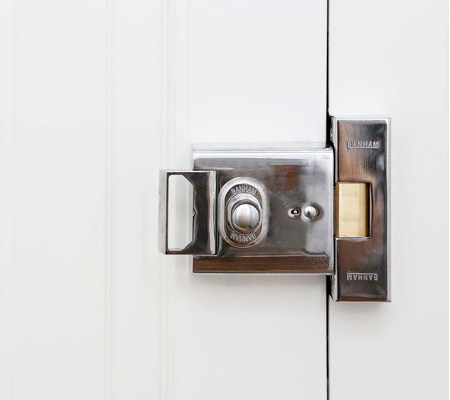Doors that impress
The right door can make or break the front of your home. An ornate door helps create a striking first impression for anyone visiting or passing by, but it’s vital to fit one that fits the style, colour and size of your home. At Core Sash Windows, we specialise in only the finest doors. All our products are bespoke, ensuring that you'll be able to find the perfect design for your home. We can match any exisiting design and send you CAD drawings to give you full confidence that we understand your needs.
Types of doors
There are many timber doors - each with its own unique appearance, style and features. The most common design styles used in the UK are:
Georgian Front Doors (1714 - 1837)
The Georgian period saw distinctive six panelled doors become the fashionable for the first time. Typically these would be made of wood but towards the end of the period they start using glass panels in the top panels of the door. Fanlights typically used many smaller panes, radiating out from a central point.

Victorian Front Door (1837 - 1901)
In the Victorian era, doors featuring four panels gained prominence. The top two of these panels were often made of wood or glass and saw a rise in decorative intricacies over time.

Edwardian Front Doors (1901 - 1910)
Front doors had become more elaborate by this period. More glass panes were added in the mid sections and sides. Stained glass was often combined with textured glass to excellent effect.

1920's / 1930's Front Doors
Larger curved glass panels with stained glass were more common in this period. Three vertical timber panels and an ornate divider with a raised letterbox were popular.

Advantages of our doors
Timber doors have many advantages over modern UPVC, fibreglass or hollow metal doors. The benefits of our high-quality timber doors include:

Improved energy efficiency
Timber is an effective insulator and all our doors are fully draught proofed, helping trap the warmth during the colder months and cool the home during warmer periods.

They’re aesthetically pleasing
Timber is an evergreen design trend - it never goes out of fashion. Timber doors suit many types of homes, old and new, giving them welcoming appeal that’s highly sought after.

Increased practicality
Timber is notoriously easy to maintain and repair. Should your door need repairing, it’s comparatively easier to mend a timber door than a UPVC one. With UPVC doors, specialists often must replace entire sections, which is more costly than quick repairs.

Bolstered security
Thick, durable timbers - with modern locking mechanisms - are incredibly secure. Well-manufactured timber doors are notoriously difficult to break into, making them an effective deterrent against opportunistic thieves.
Improved safety
Because timber doors are superb insulators, they’re handy in a fire. A well-manufactured timber door can keep a fire at bay for 30 minutes. Special reinforcement to hold an inferno back for 90 minutes - making it more effective than other composite materials.

Enhanced environmental sustainability
Timber doors are not only beautiful and functional but also represent a greener choice for eco-conscious homeowners. Being a renewable resource, timber has a lower carbon footprint compared to synthetic materials.
Get a quotation for your perfect doors
All our doors are bespoke products, so there's no compromise on design
Hardwood vs softwood
Timber door are constructed from either hardwoods or softwoods - each variant has its own benefits. Although it’s almost impossible to tell the difference visually, hardwood doors don’t expand and contract as much compared to softwoods when the temperature changes. However, softwoods are inherently more workable than hardwoods. Because they’re much less rigid, they can be more easily carved and shaped to fit smaller spaces and create more complex joints. In order to ensure that all our timber is sourced from sustainably managed forests, we offer either European Redwood for softwood, Oak for hardwood or Accoya. These materials allow us to produce Casement Windows that not only look great but are designed to be secure and are expertly engineered to prevent warping or rotting. We offer Accoya, Oak for Hardwood and Engineered Redwood for Softwood. Some examples of timber used in casement windows are:
Insurance backed guarantee & FENSA certificate
At Core Sash Windows, all of our doors come with a 10-year guarantee and are FENSA certified. This means the fitter has installed anything from our product range in accordance with strict health, safety and quality standards - meaning you’re getting the best results.
Frequently Asked Questions
If you own the home, you’ll only need planning permission if you’re extending or creating a new doorway - you don’t need to seek planning permission if you’re replacing a door in its existing spot. If you live in rented accommodation, you’ll need permission from the landowner before undertaking renovations.
According to UK building regulations, doors must have a minimum opening width of 775mm and a step no higher than 15mm. New doors also need to be fire-resistant. They also must be FD30 approved, meaning they can hold off a fire for 30 minutes.
The standard door width in the UK is 762mm - or around 30 inches. The height of a traditional UK door is 1981mm - or 78 inches. While not every door has to be exactly this size, most doors and doorways have been built around these measurements.
Contrary to popular opinion, a well-looked-after timber door will outlast a modern UPVC door. Timber doors can last up to 65 years - while the average UPVC door lasts around 35 years. However, you should consider replacing your timber doors if you notice: (1) The wood starting to warp - this may result in gaps opening up around the perimeter. (2) The front lock is damaged, or it’s a struggle to work the locking mechanism. The door is catching or rubbing on the frame - making it difficult to open. (3) There’s a spike in energy bills, or you feel a draft.
